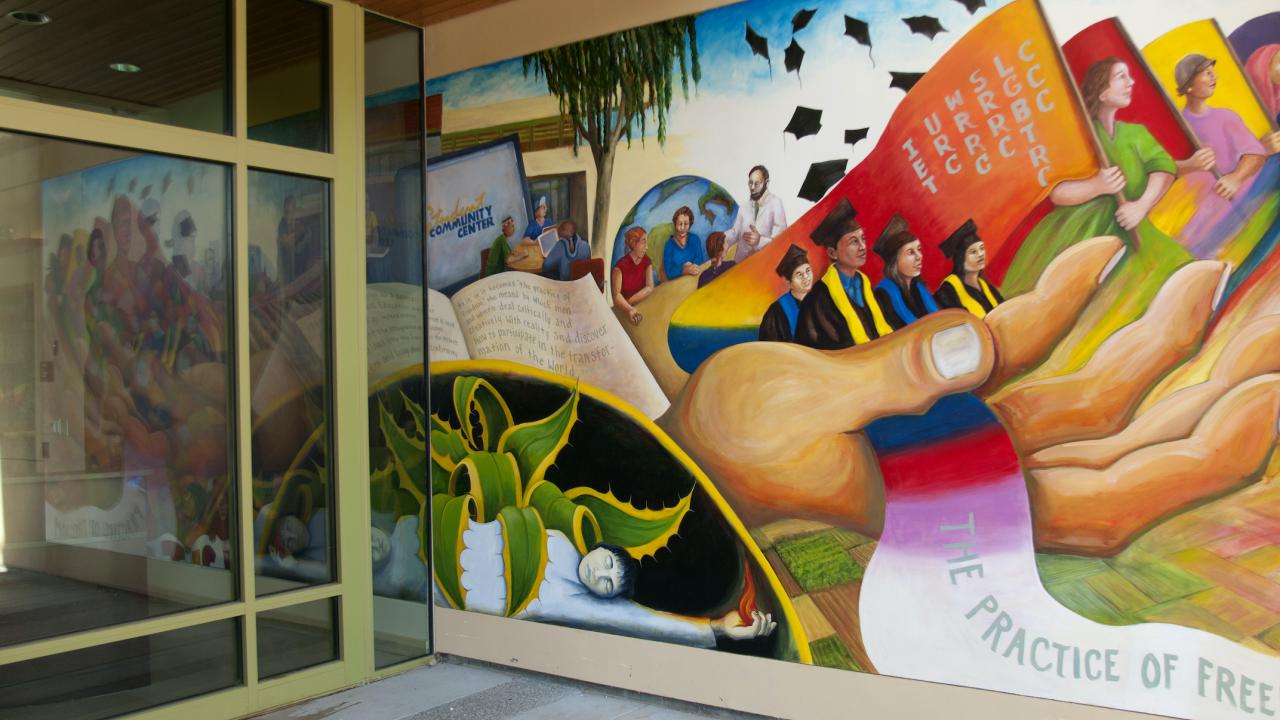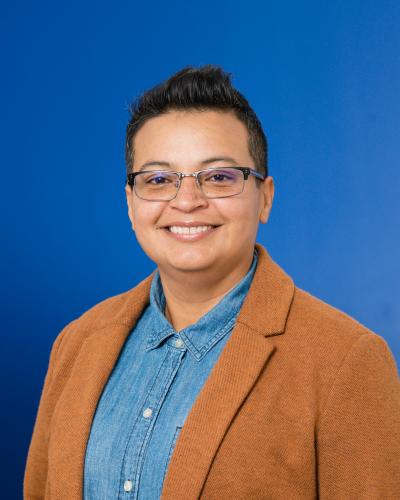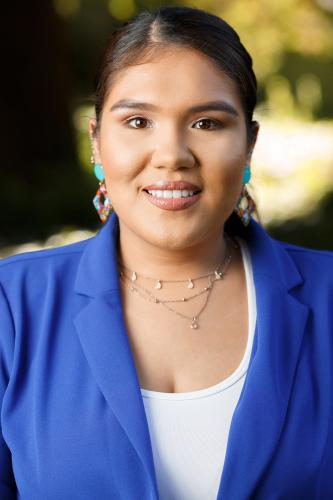
HACU’s 25th Annual Capitol Forum a Success with Aggies in the Virtual Room
HACU’s 25th Annual Capitol Forum a Success with Aggies in the Virtual Room
By Raquel E. Aldana, Associate Vice Chancellor for Academic Diversity and Professor of Law
The Hispanic Association of Colleges and Universities successfully hosted its 25th Capitol Forum the week of April 21 all on a virtual platform. Two exceptional graduate students from the School of Education, Claudia Escobar and Alicia Garcia, alongside Vice Chancellor Renetta Tull and Associate Vice Chancellor Raquel Aldana, represented UC Davis with incredible depth and heart during virtual meetings with the offices of Senators Dianne Feinstein and Kamala Harris and with Congressmembers John Garamendi and Doris Matsui.
HACU’s 2020 legislative agenda was responsive to COVID 19’s impact on higher education and in particular Minority Serving Institutions (MSIs). It also included asks related to increased appropriations funding for MSIs, urgent passage of the DREAM & Promise Act (HR 6) by the Senate, and support for the HERE Act.
The House of Representatives with all Democrat members and seven Republican members passed HR 6 with 237 votes in favor. It is now up to the Senate to act urgently in favor of the bill to ensure that the more than 450,000 undocumented students enrolled in college, only about 216,000 of whom are DACA eligible, remain in college. Unfortunately, the U.S. Department of Education (DOE) decided that DACA and undocumented students are excluded from the emergency aid to students under the CARES Act. Sens. Michael Bennet (D-Colo.) and Bob Menendez (D-NJ) have urged DOE to undo this decision, arguing that the CARES Act, which slated $6 billion to go directly to students through the Education Department, did not specify which students could have access to aid.
The possibility of DACA’s end also looms large for DACA students who sent a letter to the U.S. Supreme Court urging the Court not to affirm President Trump’s decision to rescind DACA. The letter urges to Court to consider the impact of a negative decision right now when 27,000 dreamers are health care workers, including 200 medical students, and many are in the front lines in hospitals across the country. Even if the Supreme Court were to side with Dreamers, the holding’s implementation is uncertain under the current crisis when immigration agencies are largely shut down and its reach will be on fewer than half of undocumented students enrolled in college. Moreover, because the Supreme Court’s case only protects Dreamers already with DACA status when the Trump administration rescinded the program on September 5, 2017 very few undocumented students who will enroll in college in Fall will have DACA. Most were simply too young to apply for DACA when it was still available (an applicant must be 15 years old to apply).
In sum, without Congress deciding to create a path to legalization for Dreamers not only will they be excluded from the CARES Act but most will not have work authorization to earn money to afford the cost of attending college. DREAMERS in California fare a little bit better since many but certainly not all are eligible for in-state tuition and some state-funded student aid, which does not cover graduate or professional students or nonresident undocumented students. Likely, most still need the work authorization to afford college and/or participate fully in their educational experience such as serving as graduate research students (GSRs), as teaching assistants (TA’s) or other types of paid work study opportunities. Thankfully, the University of California and California State University systems have said they will use their own funds to help the immigrant students during the pandemic. In a strongly worded statement, Chancellor May affirmed UC Davis’s commitment to our AB540, DACA and undocumented students.
HACU’s request for increased funding for MSIs is justified by the exponential growth of these institutions and federal funding that is failing to keep up while disparities in resources and outcomes persist. For example, HSIs receive 68 cents for every dollar going to all other colleges and universities annually, per student, from all federal funding sources. HSIs, moreover, educates more than 65% of all Chicanx/Latinx students in the U.S., and with supplemental federal funding, they are innovating to close opportunity gaps and function as important engines of social mobility. HACU’s ask included $170 million in Higher Education Act (HEA), Title V-Part A, $35 million in HEA, Title V-Part B; $55 million in National Science Foundation (NSF) HIS Program and $25 million in US Department of Agriculture (USDA) HSI Education Grants.
The HERE Act, introduced by Congressman Joaquin Castro, creates a new section under Title V of the HEA for a new grant program to support partnerships and collaboration between HSI colleges and universities and HSI school districts for the purpose of improving their educational attainment. HACU is proposing that $150 million be authorized to create the program. In California, the innovations that could emerge from these opportunities include closing significant gaps in the completion of the A-G curriculum and other inequities impacting our Chicanx/Latinx students who comprise nearly 55% of all high school graduates.
Finally, with the expectation of a second stimulus package coming from Congress in response to COVID-19, HACU is asking for an additional one billion dollars in emergency funding for HBCUs, TCUs, AANAPISIs, PBIs and other MSIs. Not surprisingly, this was the ask that took up the most time and also the most heart. Below are the remarks provided by Claudia and Alicia. Kudos to each of them for speaking up so eloquently on behalf of Rising Scholars.
Claudia Escobar’s Remarks:
 Like other students you may hear from in relation to funding for minority serving institutions, I am the first in my family to attend and graduate with a college degree. I am a bit farther along in my education trajectory since I have a bachelor’s degree in government, a master’s degree of public policy, and soon to hold a doctorate in education, COVID permitting. My parents are undocumented immigrants from El Salvador with an elementary school education and worked in jobs that in today’s Covid reality would have rendered them unable to provide a roof over my head and food on the table.
Like other students you may hear from in relation to funding for minority serving institutions, I am the first in my family to attend and graduate with a college degree. I am a bit farther along in my education trajectory since I have a bachelor’s degree in government, a master’s degree of public policy, and soon to hold a doctorate in education, COVID permitting. My parents are undocumented immigrants from El Salvador with an elementary school education and worked in jobs that in today’s Covid reality would have rendered them unable to provide a roof over my head and food on the table.
A college education for me represents stability and a ticket out of poverty like many others who depend on public higher ed but especially minority serving institutions. It wasn’t until I had my first graduate degree that I stopped feeling as if I was just surviving and started to feel as if I was thriving. The bit of social mobility I achieved was far enough from poverty that I felt I could come back to school and secure a doctorate degree despite my student loans. My experience at UC Davis, has empowered me to believe that I am a social scientist and that my aspirations to be a Community College President are possible. We desperately need college presidents and leaders to reflect the students they serve. I hope to build community college transfer pathways for today’s low income firstgen students to attend a CalState or UC of their choice. But these institutions need financial assistance for that to happen. COVID-19 has reminded me of how tenuous social mobility paths are for low-income firstgen students of color, their families, and university service workers who are often the same. Not supporting future emergency relief funds for MSIs sets back years of work and efforts to diversify student pipelines that prepare our future scientists, faculty, and democratic leaders. Senator Feinstein’s support of emergency relief for MSIs safeguards the American Dream that me and many others have worked really hard to achieve with the help of postsecondary education. Low-income firstgen students and respective families, like mine heavily depend on institutions such as Los Rios Community College, Sacramento State, and UC Davis for stability today and their future.
COVID 19 has hit higher education extremely hard. As the world’s largest public university system, UC is confronting many of the worst impacts of the virus all at once. We estimate that in March alone our losses exceeded 310 million in new expenditures and lost revenues, 80 million at UC Davis alone. UC is grateful for the much needed 26O million in direct assistance through the CARES Act but it is not sufficient to help us cover our losses in this first month of likely a prolonged crisis. California’s legislature is already preparing all our public postsecondary institutions for no increases to our already thin budgets in this next budget cycle given the enormous hit to state revenues. Our Community Colleges and CalStates have been similarly impacted by COVID as you’ll hear from them. I ask that Senator Feinstein consider and support our nation’s low-income communities in any future relief package by investing an additional $1 billion in emergency funding for HBCUs, Tribal Colleges, HSIs, AANAPISIs, Predominantly Black Institutions** and other Minority-Serving Institutions.
Alicia Garcia’s Remarks:
 My name is Alicia Garcia, and I am a first generation, Mexican-American, proud daughter of immigrants and an essential farmworker. Currently, I am a Ph.D. student in Education at UC Davis studying the retention of underserved students in higher education, broadly.
My name is Alicia Garcia, and I am a first generation, Mexican-American, proud daughter of immigrants and an essential farmworker. Currently, I am a Ph.D. student in Education at UC Davis studying the retention of underserved students in higher education, broadly.
As a low-income student, I have always depended on the services offered to me by my university. When Covid-19 started here in the U.S., I decided to go back home, along with my siblings who are also in college, as we knew we had to combine our resources to help our parents and make ends meet through these difficult times. I was home for the last three weeks, but being from a rural community in the Central Valley, we have very limited access to Internet. In our household, we decided to get the fastest option for WiFi since we were all heading home, but even then, my internet crashed at least four times a day. Knowing that I had this HACU capitol forum, I made the difficult decision to leave my home to head back to Davis as I knew I would have a reliable internet connection here as I prepared for this forum.
As I mentioned, as a low-income student, I have always been dependent on the services provided to me by my institution such as the food pantries, financial aid, discounts on meats and protein at the dairy farm, and easy access to CalFresh, for example. But now, with the increase in financial obligations, my dependence on resources provided by my institution has exacerbated. My home department, the School of Education, is assisting their students who have been financially impacted by Covid-19 by providing emergency grants to pay for resources and equipment needed to conduct our research and teaching responsibilities from home with hopes of alleviating some of the financial stressors. This financial support will be helpful and I am extremely grateful for it. As we know, financial stress not only impacts low-income students like myself, mentally and physically, but also our academics and ability to focus on our work when most of our time is spent worrying about and finding solutions on how we will pay our next bill. By investing an additional $1 Billion in emergency fund for Minority Serving Institutions (MSIs) who serve a large proportion of the nation’s low income and underserved students, the resources institutions of higher education could provide students like myself would be even greater. Thank you so much for your time.
